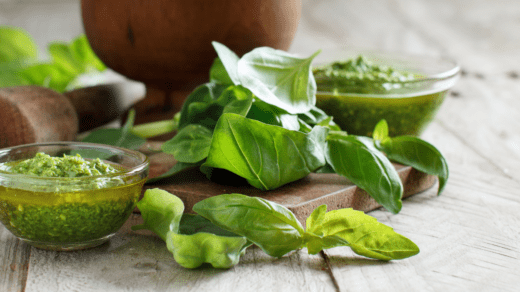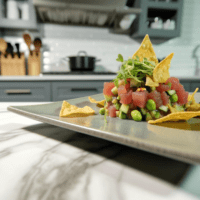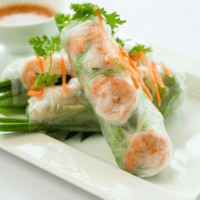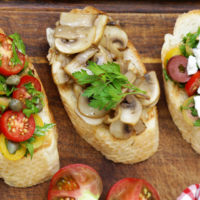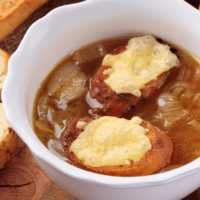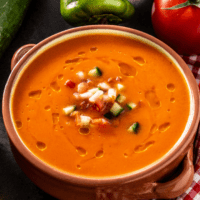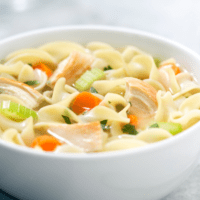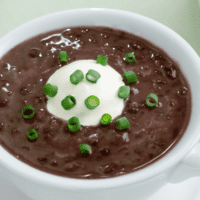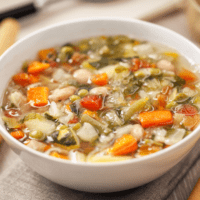Hey There! Some links on this page are affiliate links, which means that as an Amazon Associate, I may earn a small commission at no extra cost to you. I greatly appreciate your support! Learn more on my Affiliate Disclosure page.
Craving a light, refreshing, healthy meal that’s also a joy to prepare? These Fresh Spring Rolls with delectable Thai Peanut Sauce are just what you need! Created by Chef Mark Sandoval, this recipe is ideal for both novice cooks and experienced chefs, combining bright flavors and textures in a straightforward, hands-on approach.
With a blend of fresh vegetables, succulent shrimp, and aromatic herbs, all wrapped in delicate rice paper, these spring rolls are as delightful to eat as they are to prepare. Let’s dive into the ingredients and tools needed to get started.
Why You Will Love This Recipe

If you love fresh, flavorful food that is easy to prepare and visually stunning, you will adore this recipe! These spring rolls are not only healthy and delicious but also incredibly versatile.
Whether you’re looking for a light lunch, a creative appetizer, or a crowd-pleasing dish for your next gathering, these rolls have got you covered. Plus, the Thai peanut sauce adds a creamy, nutty flavor that perfectly complements the fresh ingredients.
It’s a great recipe for your culinary repertoire, especially if you enjoy experimenting with Asian-inspired flavors!
Ingredients You’ll Need

Before you begin, let’s examine the ingredients required for making these delightful spring rolls and their accompanying Thai peanut sauce. The ingredients are simple and easily found in your local grocery store or Asian market.
| SPRING ROLL INGREDIENTS | DESCRIPTIONS |
|---|---|
| Spring roll wrappers | Thin rice paper that holds the filling together. |
| Glass noodles | Translucent noodles are made from mung bean starch. |
| Shrimp | Lightly poached and split for easy rolling. |
| Carrot (julienned) | Adds crunch and color to the rolls. |
| Bean sprouts | Fresh, crisp, and nutritious. |
| Mango (sliced) | Sweet and juicy for a tropical twist. |
| Basil (fresh) | Adds a fragrant, peppery flavor. |
| Mint (fresh) | Refreshing and aromatic. |
| Salt | Enhances all the flavors. |
| Sweet Thai chili sauce | For a sweet and spicy dipping option. |
| Lime | Adds a zesty kick to the dipping sauce. |
| THAI PEANUT SAUCE INGREDIENTS | DESCRIPTIONS |
|---|---|
| Toasted peanuts (¼ cup) | Adds a nutty flavor and texture to the sauce. |
| Brown sugar (¾ cup) | Balances the saltiness and acidity with sweetness. |
| Soy sauce (1.5 tbs) | Provides a salty, umami flavor. |
| Lime juice (¼ cup) | It adds a refreshing acidity. |
| Coconut milk | Creamy and rich, it enhances the sauce’s consistency. |
| Curry powder (1 tbs) | Adds warmth and depth of flavor. |
| Chili oil (1 tbs from Lao Gan Ma) | Spicy and aromatic, it adds heat to the sauce. |
| Rice vinegar (1 tsp) | Mild acidity for balance. |
| Ginger vinegar (¼ cup) | Adds a sharp, spicy undertone. |
| Peanut oil (¾ cup) | It helps emulsify the sauce, making it smooth and glossy. |
| Lao Gan Ma chili sauce (1 tbs) | Complex heat with a depth of flavor. |
Kitchen Tools You’ll Need

To make these spring rolls, you’ll need a few essential kitchen tools. These tools help prepare the ingredients precisely and ensure a smooth cooking process.
| KITCHEN TOOL | PURPOSE |
|---|---|
| Mandoline slicer | For thinly slicing vegetables evenly. |
| Peeler | To peel vegetables like carrots and mangoes. |
| Chef’s knife | For chopping and preparing ingredients. |
| Serrated knife | Ideal for cutting the finished spring rolls cleanly. |
| Kitchen towels | To handle ingredients and dry them as needed. |
| Measuring spoons | For precise measurement of ingredients. |
| Kitchen blender | To blend ingredients for the Thai peanut sauce. |
| Saucepan | To boil water for the noodles and poach shrimp. |
| Kitchen tong | For handling hot ingredients safely. |
| Strainer | To drain the glass noodles and shrimp. |
| Cutting board | For chopping and assembling ingredients. |
| Paper towels | To dry and handle the rice paper wrappers. |
| Kitchen pan | Used for additional cooking as needed. |
Fresh Spring Roll Step-By-Step Recipe Instructions
Now that you have all your ingredients and tools ready, let’s begin making these fresh and delicious spring rolls.
Prepare the Ginger Vinegar (Advance Preparation):
Before making the spring rolls, prepare the ginger vinegar in advance. This step adds a wonderful depth of flavor to your peanut sauce.
- Step: Slice ginger into thin coins and soak in rice vinegar for at least 24 hours.
Cook the Glass Noodles:
Glass noodles are key in these spring rolls, adding a delightful chewy texture.
- Step: Bring a saucepan of water to a boil. Add the glass noodles and cook for 2-3 minutes until they turn clear.
- Tip: Immediately strain and rinse under cold water to stop the cooking process and keep the noodles from getting sticky.
Poach the Shrimp:
The shrimp should be lightly poached to keep them tender and flavorful.
- Step: Poach the shrimp in court bouillon until just cooked through. Remove and let cool, then split each shrimp in half lengthwise.
Prepare the Thai Peanut Sauce:
A good peanut sauce is the star of this dish. It should be creamy, flavorful, and have a bit of a kick.
- Step: In a blender, combine coconut milk, toasted peanuts, brown sugar, soy sauce, lime juice, curry powder, chili oil, rice vinegar, and ginger vinegar. Blend until smooth.
- Step: Slowly emulsify with peanut and chili oil from Lao Gan Ma sauce by adding it to the blender while blending until the sauce is smooth and glossy.
Prepare the Spring Roll Wrappers:
Handling rice paper can be tricky, but with a bit of practice, you’ll get the hang of it.
- Step: Soak each spring roll wrapper in warm water for a few seconds until soft, then lay it flat on a damp kitchen towel.
Assemble the Spring Rolls:
This is where the magic happens. Be gentle but firm while rolling.
- Step: Place a small handful of glass noodles, shrimp, julienne carrots, bean sprouts, mango slices, basil, and mint leaves on the lower third of the rice paper. Season lightly with salt.
- Step: Fold the sides inward and roll them tightly away from you, much like a burrito.
Cut and Serve:
For a clean presentation, use a serrated knife to cut the rolls.
- Step: Cut the spring rolls in half with a gentle sawing motion using a serrated knife.
- Step: Serve immediately with Thai peanut sauce and/or sweet Thai chili sauce on the side.
Tips, Tricks, and Storage Options

When making Fresh/Raw Spring Rolls, a few helpful tips and tricks can elevate your rolling game and ensure your rolls stay fresh and delicious. Here’s how to make the most of your ingredients and tools:
| TIPS & TRICKS | DESCRIPTIONS |
|---|---|
| Mastering the Rice Paper Wrappers | The key to perfect spring rolls is properly handling the rice paper wrappers. These wrappers can be delicate, so soak them in warm water for only a few seconds until they become pliable. Lay them flat on a damp kitchen towel to prevent sticking. If your wrappers tear, don’t worry! To strengthen the torn one, layer a second wrapper over it. With practice, you’ll get the timing just right. |
| Getting the Right Roll | When assembling the rolls, don’t overfill them. This will make rolling difficult and could cause the wrappers to tear. Aim for a compact, even filling to make rolling easier and to achieve a neat, tidy roll. Use a light touch when folding the sides and rolling the wrapper. Think of it like rolling a burrito or sushi—firm but gentle, ensuring all the ingredients stay securely inside. |
| Maintaining Freshness | Keep your workspace and ingredients well-organized. Prepare all your fillings in advance and keep them within reach. This helps maintain the integrity of the ingredients and speeds up the assembly process. If you’re making these ahead for a party or meal prep, wrap each roll individually in plastic wrap. This prevents them from sticking together and drying out. Store them in the refrigerator and consume them within a day for optimal freshness. |
| Preventing Stickiness | After cooking the glass noodles, immediately rinse them in cold water to stop further cooking and remove excess starch. This prevents the noodles from becoming sticky and clumping together. Keep a bowl of warm water nearby while working with the rice paper wrappers to keep your hands damp. This prevents the wrappers from sticking to your hands and makes handling easier. |
| STORAGE OPTIONS | DESCRIPTIONS |
|---|---|
| Short-Term Storage | Fresh spring rolls are best enjoyed immediately, but if you need to store them, line a container with a damp paper towel, place the rolls on top, and cover them with another damp paper towel. This keeps them moist and prevents drying out. |
| Refrigeration | If you plan to store the rolls for later, wrap each roll individually in plastic wrap to keep them fresh and prevent sticking. Store them in an airtight container in the refrigerator. To retain their texture and flavor, they are best eaten within 24 hours. |
| Avoid Freezing | Freezing spring rolls is not recommended, as the rice paper wrappers become brittle and lose their chewy texture once thawed. The filling may also lose its fresh, crisp quality. |
Serving Suggestions, Pairings, and Recipe Variations

Fresh Spring Rolls are incredibly versatile and can be tailored to suit various tastes and occasions. Here are some serving suggestions, pairings, and variations to inspire you:
| SERVING SUGGESTIONS | DESCRIPTIONS |
|---|---|
| Appetizer or Main Course | Serve these spring rolls as a light appetizer before a larger meal, or increase the quantity to serve them as a main course. They are perfect for parties, potlucks, or casual family dinners. Present them on a large platter with small bowls of Thai peanut sauce and sweet Thai chili sauce on the side for dipping. Garnish with extra mint and basil leaves for a beautiful presentation. |
| Build-Your-Own Spring Roll Bar | For a fun and interactive dining experience, set up a build-your-own spring roll bar. Provide a variety of fillings, such as shrimp, tofu, grilled chicken, assorted vegetables, and fresh herbs, and allow guests to assemble their rolls according to their preferences. This setup works wonderfully for family gatherings or casual get-togethers, encouraging everyone to get involved and enjoy a hands-on dining experience. |
| As Part of an Asian-Inspired Meal | These spring rolls pair beautifully with other Asian-inspired dishes like Vietnamese pho, Thai green curry, or a light miso soup. They add a fresh, crunchy element that complements warm, hearty dishes. |
| PAIRINGS | DESCRIPTIONS |
|---|---|
| Beverages | Pair your spring rolls with a crisp white wine like Sauvignon Blanc or a light, slightly sweet Riesling. These wines balance the fresh flavors and the spice of the dipping sauces. For a non-alcoholic option, serve with iced green tea, a refreshing cucumber lemonade, or a mild ginger ale to complement the rolls’ freshness. |
| Sides | Serve with a side of Asian slaw or cucumber salad for additional crunch and freshness. To round out the meal, you could also pair it with steamed dumplings or a small bowl of jasmine rice. |
| RECIPE VARIATIONS | DESCRIPTIONS |
|---|---|
| Vegan or Vegetarian Spring Rolls | For a vegan option, replace shrimp with tofu or tempeh. Marinate the tofu in soy sauce and sesame oil, then bake or grill for added flavor. To enhance the texture and flavor profile, include a variety of colorful vegetables, such as bell peppers, cucumbers, or avocado. |
| Fruit Variations | Add different fruits like pineapple, papaya, or even strawberries for a sweeter twist. Fruits add a surprising element of flavor and make the rolls more vibrant and fun. Combine fruits with fresh herbs like cilantro and mint to create a unique flavor combination that’s both refreshing and exciting. |
| Protein Alternatives | Grilled chicken, beef, or pork can be used in place of shrimp. Thinly slice the meat and season it with soy sauce and garlic for added flavor. Try crab meat or smoked salmon for a seafood twist, which pairs nicely with the other ingredients. |
| Herb and Spice Adjustments | Play around with different herbs like cilantro, Thai basil, or dill. Each herb brings a different aromatic profile to the rolls, making each bite a unique experience. You can adjust the spice level by adding more or less chili oil or using a different type of chili sauce, depending on your heat tolerance. |
By experimenting with these variations, you can make this recipe your own and enjoy a different twist each time. Remember, the beauty of these spring rolls lies in their versatility and the endless possibilities for customization.
Conclusion

There you have it! Fresh/Raw Spring Rolls with Thai Peanut Sauce are a delicious and healthy choice for any occasion. They are easy to make, customizable to your liking, and a fun way to enjoy a variety of fresh, vibrant ingredients. Whether you’re a seasoned cook or just starting in the kitchen, this recipe is a great addition to your repertoire.
Ready to get started on your spring roll adventure? Gather your ingredients, follow the steps, and enjoy the delightful flavors of this Asian-inspired dish. Don’t forget to share your culinary creations on social media with the hashtag #CookWithCem!
Thank you for reading! If you enjoyed this recipe, follow us on social media and subscribe to our blog for more delicious recipes and cooking tips.
Happy cooking!
FAQs – Frequently Asked Questions

Can I make these spring rolls ahead of time?
Yes, you can prepare the ingredients ahead of time, but it’s best to assemble the rolls just before serving to maintain their freshness and texture. If you need to store them, wrap them individually in plastic wrap to prevent drying out.
How do I keep the rice paper from tearing?
To prevent tearing, soak the rice paper in warm water just until pliable, not too soft, and work on a damp surface. Handle the rice paper gently and roll carefully to avoid any breaks.
What are some alternatives to shrimp?
For a vegetarian or vegan option, you can substitute shrimp with grilled chicken, tofu, or even more vegetables. Each alternative adds a different flavor profile to the rolls, allowing for customization.
Can I freeze these spring rolls?
Freezing is not recommended because the rice paper becomes brittle and changes texture when thawed. It’s best to consume them fresh or store them in the refrigerator for up to a day.
How long can the peanut sauce be stored?
The Thai peanut sauce can be stored in an airtight container in the refrigerator for up to a week. Stir well before serving to ensure the ingredients are well mixed.
Are these spring rolls gluten-free?
Yes, these spring rolls are naturally gluten-free as long as all the ingredients, especially sauces, are certified gluten-free. Always check product labels to ensure no hidden gluten.
What can I use if I don’t have a mandoline slicer?
A sharp chef’s knife works perfectly well to slice vegetables thinly by hand. Take your time to ensure even slices for the best texture.
Can I omit the glass noodles?
You can omit the glass noodles if you prefer a lower-carb option or replace them with more vegetables for added crunch. The rolls will still be delicious and full of flavor.
How do I adjust the spice level?
To adjust the spice level, add more or less chili oil or use a milder or hotter chili sauce according to your preference. This allows you to customize the heat to suit everyone’s palate.
Hey There! Some links on this page are affiliate links, which means that as an Amazon Associate, I may earn a small commission at no extra cost to you. I greatly appreciate your support! Learn more on my Affiliate Disclosure page.




